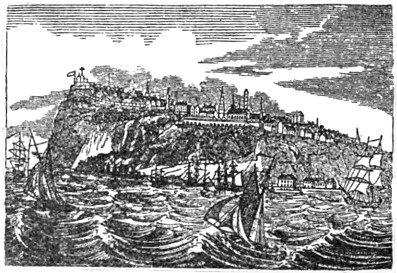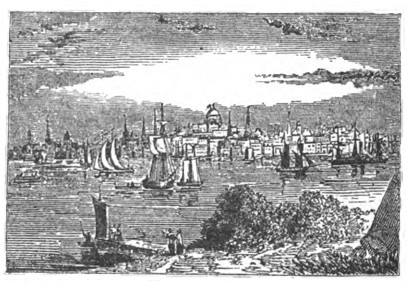| Web
and Book design,
Copyright, Kellscraft Studio 1999-2009 (Return to Web Text-ures) |
 (HOME)
|
|
Chapter
V
Of
Eunice Among the Indians in Canada — The Jesuits and the Prisoners
— Mr. Williams Is Allowed to Visit His Daughter — Attempts to
Redeem Eunice
EUNICE was taken by her captor to his home at Caughnawaga, the Indian settlement, nine miles above Montreal. Her father at length reached the latter place, and as soon as he learned where Eunice was held, he begged permission to see her. This was given reluctantly, and only at the express command of the governor, in whom the English found a considerate foe, if he was not a positive friend. The dominant influence in control of the child was that of the Indians and the Jesuit priests by whom this particular band of Indians had been converted. No doubt her Indian master made the white child useful, and it may be he took a fancy to her that made him reluctant to part with her for ransom money. But there is no question as to the position of the Jesuits. They showed the greatest eagerness for proselyting; and kidnaping, and threats, and torture were naught if they could by those means save souls. Their power was always used to retain the children of the English, to make them forget their earlier impressions and homes, and to adopt the true religion. The priests told Mr. Williams that the Mohawks would as soon part with their hearts as his child. The governor had no power to compel the Indians to surrender the child, as they were allies rather than subjects, and the priestly faction was too powerful for him to directly oppose. The father's interview with his daughter lasted an hour. The little girl did not like her Indian life and cried to be taken away. Among other things she said that the savages did not keep the Sabbath, and she thought, a few days before, they "had been mocking the devil," and these things troubled her New England conscience greatly. Her father told her to pray every day and not to forget her catechism or the Scriptures she had learned by heart. In reply the child said that "a tall, lean man in a black gown comes and makes me say some prayers in Latin, but," she added, "I don't understand one word of them; I hope it won't do me any harm." The interview came to an end and the minister went sadly back to Mont real. The governor made every effort to secure the child's release, but without success. He understood he had the promise of her at one time if he would procure an Indian girl in her stead, and he sent a long distance up the river for one. But when he offered her she was refused. He agreed to pay them a large sum of money, but they said, "No." Finally his lady went over and begged the little girl from the tribe, but all in vain. She staid on, she was dressed as an Indian, she lived as one, and at length she had well-nigh forgotten how to speak English. Three years passed and it was reported that she herself was unwilling to leave the life she had adopted. Mr. Williams and the others of his family had all been redeemed by the end of 1706. Their period of captivity had not been all hardship. The French, in general, showed them only kindness. Real pity seemed to be felt for the prisoners, and some declared openly that they decried the official methods of conquest. They said that to send the Indians, with their barbaric notions of warfare, against the English was no better than massacre. With the official class the captives did not fare so well. They found most of them given to intrigue and double dealing. As for the Indians, they were crafty and uncertain, and the priests were apt to be so zealous for the religion of Rome, and so bent on making all the world accept their faith, whether it would or not, that the springs of sympathy were dried up within them. Yet, if the methods of the latter were sometimes unfeeling and cruel, those of the captives in dealing with the priests were not above reproach. Mr. Williams himself was very bumptious on the subject of religion, and was often needlessly irritating in his talk with the Jesuits. He told them openly that they were humbugs and their religion a lie, and that his own New England doctrine was the only true stripe. Nothing would persuade him to enter one of their churches — he would as soon go into a workshop of Satan's. So each party saw things their own way, and each, in the view of the other, was going in obstinacy and blindness straight down the road that led to Sheol. Mr. Williams, in the final pages of his book, bespeaks the prayers of all New England for the ten-year-old daughter he left behind in Canada. No doubt this request met with wide response. In his own prayers she was remembered as long as he lived, and he never ceased to petition, not only for her release, but for the soul jeopardized by the influence of the priests. It is known also that she was constantly prayed for by her brother, Rev. Stephen Williams of Longmeadow, who was concerned both for her "Spiritual and Eternal Good," and that "God would touch her heart and incline her to turn to her friends."  A few days after Mr. Williams reached Boston from Quebec, he was visited by a delegation from Deerfield, and in behalf of the town was entreated to return to his former parish. After due deliberation the call was accepted. A new house was built for him and in a short time he married again and the troubled days of capture and captivity seemed largely to be laid away in the silence of the past, out of sight and out of mind. But he did not forget the daughter in Canada.  On one occasion, the report was brought to Deerfield that Eunice William's Indian master had promised to bring her home within two months, but the two months went by and the captive did not return. Several years passed and in 1711 an Indian squaw came timidly into the heart of Boston and sought the old Province House. She wished to see the governor, and she asked of him her children, captured recently and now held in Boston. The governor thinks and then he speaks. He says he will exchange the children of the woman for Eunice Williams, now held captive by the praying Mohawks of Caughnawaga. Forth went the squaw and for many long summer days she pushed on through the wilderness toward Montreal. But when she reached her journey's end there was the same old mystery of delay and objection. At last the offer was made by the French of four other English prisoners to be given instead of Eunice, and the offer was accepted and the Boston pappooses went to the mother, and the minister's daughter was still among the Indians. In 1713, John Schuyler made the journey to Canada in the interest of the prisoners held there and he took pains to see Eunice at Caughnawaga with the hope to bring her away with him. But he found that she had not only accepted the faith of the Jesuits and been re-baptised Margaret, but that she was now married to a young Indian. She, with her husband, was brought in to see Schuyler at the house of one of the priests. He reports her to have been looking "very poor in body and bashful in the face." He desired her to sit down, which she did. First he spoke to her in English, but she did not respond. He thought she could not understand and then employed his Indian "Languister" to convey what he would say to her. Nevertheless, she would speak not one word. Finally Schuyler asked the priest to talk with her, and beg of her, if she would not return home to stay, at least to go to see her father and afterward return to Canada. But she continued silent until the very last, when, in response to a final appeal, she said in a low voice, "Zaghte oghte," which in English means, "It may not be." Those words were the only ones she would vouchsafe in all the two hours Schuyler spent with her. Schuyler was much moved, now compassionate, now indignant, and he said to her as he left, "Had I made such proposals and prayings to the worst of Indians, I do not doubt but I would have had a reasonable answer and consent to what I said."  At this Eunice's husband touched Schuyler on the arm and said in broken English, "She no go. Her father marry twice times. He no have marry, she go." Schuyler said no more. He caught Eunice's limp, unresisting hand within his two strong brown ones and held it a moment, then turned on his heel and hurried away. |